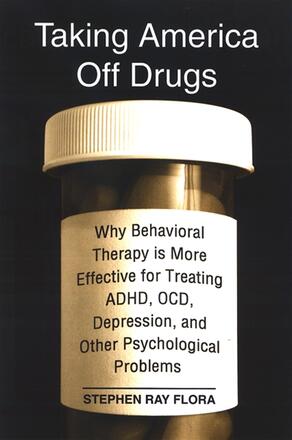
Taking America Off Drugs
Why Behavioral Therapy is More Effective for Treating ADHD, OCD, Depression, and Other Psychological Problems
Alternative formats available from:
Argues for the superiority of behavioral treatments over drug therapies for psychological problems.
Description
In this highly provocative book, Stephen Ray Flora maintains that we have been deceived into believing that whatever one's psychological problem—from anxiety, anorexia, bulimia, depression, phobias, sleeping and sexual difficulties to schizophrenia—there is a drug to cure us. In contrast, he argues that these problems are behavioral, not chemical, and he advocates behavioral therapy as an antidote. He makes the controversial claim that for virtually every psychological difficulty, behavioral therapy is more effective than drug treatment. Not only that, but the side effects of behavioral therapy, rather than being harmful like many drugs, are actually beneficial, often facilitating self-empowerment through learning functional life skills.
Stephen Ray Flora is Professor of Psychology at Youngstown State University and is the author of the CHOICE Outstanding Academic Title The Power of Reinforcement, also published by SUNY Press.
Reviews
"…a short, simple, and passionate book … it would be little short of tragic if readers did not take Flora seriously." — Psychological Record
"…this book is a useful corrective to the current state of overdiagnosis and overmedication." — CHOICE
"…Flora has done an excellent job in exposing the deficits in the drug therapy model as the treatment of choice for all mental 'disorders.' His book would be the perfect read for a college student, policymakers, and consumers, for it provides a vast amount of research supporting behavioral therapy and indicating the flaws of drug therapy." — International Journal of Behavioral Consultation and Therapy
"I like the author's obvious deep-seated concern about the book's topic and the enthusiasm with which he addresses it. He explains why the behavioral approach is more effective than drugs, and how it importantly differs from the drug approach. I hope this book will be widely read. Our society needs it." — P. A. Lamal, editor of Cultural Contingencies: Behavior Analytic Perspectives on Cultural Practices
"This topic is an important one that has implications for the treatment of many children and adolescents. I like the author's passion for the subject matter; he clearly wants to make a point. He has certainly 'done his homework.'" — David Reitman, coeditor of Practitioner's Guide to Empirically Based Measures of School Behavior